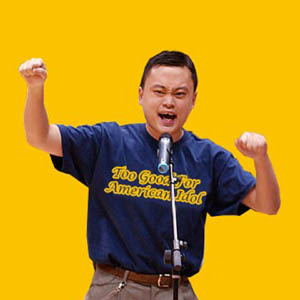![[Metroactive Music]](/music/gifs/music468.gif)
[ Music Index | Silicon Valley | Metroactive Home | Archives ]

American Splendor: William Hung won over America by just being himself. More Than a Feeling What does William Hung's loss and subsequent rise say about pop iconography and ourselves? By Sharon Mizota WILLIAM HUNG set out to become an American Idol and ended up a pop icon. The UC-Berkeley civil engineering student's notorious performance of Ricky Martin's "She Bangs" has spawned numerous web salutes and remixes, a Saturday Night Live parody and an appearance on The Ellen Degeneres Show. An encore performance of "She Bangs" on American Idol last week confirmed his status as the hottest accidental rock star today. This week, he inked a recording contract with Koch Records and Fuse Music Network. His debut album, The True Idol, sees releases on April 6. So what is it about William that inspires such fervent fascination? It's the "awww" factor. His awkward, heartfelt performance never fails to elicit an "awww," which is neither unequivocal praise nor damnation. "Awww" starts out as the bright, familiar sound reserved for something cute and endearing and then slides ever so slightly down to a darker, mournful note of pity. William, as my friends in junior high used to say, is "puppy-dog cute," which means we like him but are slightly embarrassed to admit it, because he's not "cute cute" (i.e. hunky)--just cute enough to feel sorry for. In an age where people will do/say/eat anything to be on TV, we're charmed by William's sincerity. His response to the judges' rejection--"I already gave my best. I have no regrets at all"--is completely devoid of the entitlement that turns other would-be's into divas. To William, a winning performance is a process he has yet to perfect. Like engineering, stardom will eventually fall prey to hard work and perseverance; he is undeterred by this minor setback. William had the guts to take the secret dream of every shower singer and karaoke devotee and make it real. His courage touches one of our most treasured American desires: We wish life was an even playing field. If you work hard enough and believe in your potential, one day everyone else will see it too. But William's apparent faith in the fairness of the music biz also arouses our pity. He's so earnest and so completely ill suited to pop stardom that we know he's never going to "make it." But his bravery is poignant in the face of insurmountable odds. It's like that climactic scene in the Civil War movie Glory. You know the black battalion is going to be decimated, you know the Union army has set it up that way (black lives being more expendable than white ones), but by golly, you want those soldiers to take that hill. It's a valiant gesture, totally sacrificial and completely moving. OK, that's a little dramatic, but William is up against the same odds. Popular music is saturated with one-dimensional images (if not music) of Asian women, but Asian men are all but invisible compared to white and black male stars. In the conflation of sound and sex that is American popular music, there are no precedents for Asian American success. Masking this racism, and built into the American Idol premise, is the notion of "talent." It's fascinating how this word has become hard-coded in our heads to encompass a very limited range of traits. We recognize good singers as people who sound like, but not too much like, famous people. The whole notion of songs as archetypes that require personal interpretation has been bulldozed by the power of celebrity. We sing the singer, not the song. The American Idol judges purport to be looking for singers who show personality, who "make a song their own." But they repeatedly choose contestants who remind them of famous people: the next Lauryn Hill or Aaron Neville. Granted, most of the people on American Idol just want to be on TV. It's not just a singing contest after all, it's entertainment, and the producers make sure that the program has its complement of men in bear suits and women with baritones. Then along comes William Hung, who actually did make a song his own with such heart and goodwill that it was almost impossible to laugh at him. Almost. He doesn't fit within our narrow definition of talent, but there's no denying his sincerity. His performance restored what is fun and heartening in music, taking it away from the cookie-cutter pop idol and giving it back to us.
Send a letter to the editor about this story to letters@metronews.com. [ Silicon Valley | Metroactive Home | Archives ]
|
From the March 10-17, 2004 issue of Metro, Silicon Valley's Weekly Newspaper.
Copyright © Metro Publishing Inc. Metroactive is affiliated with the Boulevards Network.
For more information about the San Jose/Silicon Valley area, visit sanjose.com.